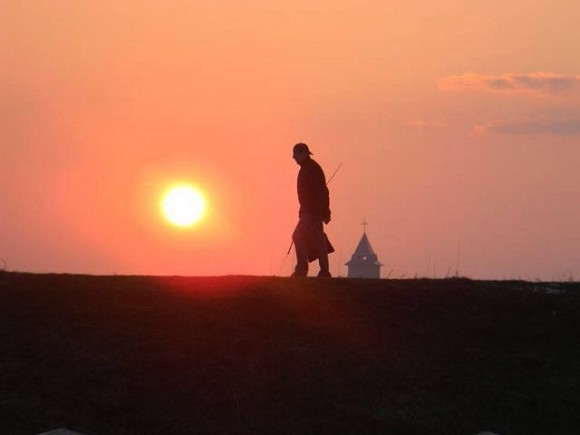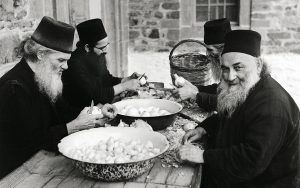The center of the liturgical year in the Orthodox Church is Pascha, the celebration of Christ’s Resurrection. It is extolled in the services as the Feast of feasts and Triumph of triumphs. Justifiably so, for as the Apostle Paul declares, if Christ be not risen, then is our preaching vain, and your faith is also vain (I Cor. 15:14). Through His redeeming Passion, Christ freed us from the tyranny of death and opened for us the door to Paradise and eternal life. This is the goal of our life-long spiritual journey, a journey from death to life, from darkness to light. It is a long journey and we travellers get weary; we get distracted and wander off or even lose sight of the road. To help keep us focussed, the Church every year compresses for us this journey as it prepares us to greet the Feast of Christ’s Resurrection, which is a foretaste of that eternal Pascha.
We usually think of this preparatory time as the period of Great Lent, but in fact it begins three weeks earlier with the Sundays of the Publican and Pharisee, the Prodigal Son and the Last Judgment. Since we are not fasting yet, we tend to pay less attention to these preparatory Sundays than we do to the Sundays of Great Lent, and yet they are very important, as they give us a map, as it were, of our lenten journey.
Already a week before the Sunday of the Publican and Pharisee, which opens The Lenten Triodion, we hear intimations of the approaching period of lent. The Gospel reading for that Sunday relates the story of Zacchaeus, “the chief among the publicans,” a rich tax-collector despised for his extortionary practices. He must have been a hard man, but the voice of his conscience had not been completely stifled, for he came to realize that he had taken the wrong path in life. But what could he do? Perhaps the great teacher people were talking about could help him. When he heard that Jesus Christ was to pass by, he climbed up into a sycamore tree in order to catch sight of Him over the crowd, for Zacchaeus was “short of stature.” Any self-consciousness or concern that he, such a public figure, would be laughed at and scorned, was overcome by his intense desire to see the Lord, his desire to get help in order to set his life aright. And what happened? Jesus Christ not only acknowledged him, He came to his house. Zacchaeus’ heart expanded in the presence of this Love, he resolved to make amends to the people he had wronged; in a word, he was on his way to a new life. As we approach the fast, we must have this same desire, the same state of mind as Zacchaeus. If we genuinely desire to catch sight of the Lord amidst the worldly vanities, God will visit us. We must simply have the desire
to receive Him in the home of our heart.
The services for these preparatory weeks are located in the Lenten Triodion, beginning with the Sunday of the Publican and Pharisee. You will find differences in the usual services.
At the Sunday Matins, after the reading of the Gospel and the 50th Psalm, special stichera are chanted: “Open to me the doors of repentance, O Giver of Life.” These stichera are sung through the Fifth Sunday of Great Lent.
A special feature of the preparatory Sunday services is the chanting of Psalm 136, “By the rivers of Babylon,” after the usual Polyeleos sitchera, “Praise ye the name of the Lord, Allelluia!” It was sung by God’s chosen people in their exile in Babylon and reflects our bondage to sin that has taken us far from our heavenly homeland. These weeks also include a special commemoration of departed Orthodox Christians “from all ages,” when we particularly pray for the souls of those who did not receive a church burial when they died, who died suddenly or violently, without opportunity for a final repentance. On the eve of this Saturday for the Dead, before the Sunday of the Last Judgment, we hear in church hymns from the funeral service.
For most of us, the dominant feature of Great Lent is fasting from certain foods. Here, too, these preparatory weeks lead us gradually towards stricter abstinence. Following the Sunday of the Publican and Pharisee, the usual Wednesday and Friday fasts are not observed, that we might not boast in keep in he fasting “rules,” and as a reminder that fasting is only a means, an aid on the path to salvation; it is not a ticket to heaven. The next week we return to the wise moderation of the Church’s discipline, observing the usual Wednesday and Friday fasts. It is called Meat-fare Week, because at the end of that week, on Sunday, we stop eating meat for the duration of Great Lent. This follows with Cheesefare week which ends on Forgiveness Sunday with us starting Great Lent by asking our family, friends, and neighbors for forgiveness.
Yes. We need to prepare to observe Great Lent by observing the weeks of preparation.




















